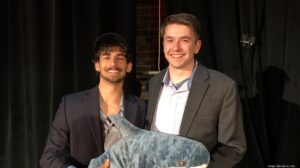Clutching a plush shark, Alec Brewer, the co-founder and CEO of Ourobio, beamed Tuesday from the stage at the Byrd Theatre. The cuddly sea hunter marked his company as winner of a $1,500 cash prize for a “Shark Tank”-style competition at the the Lighthouse Labs Demo Day showcase.
“The cash is critical to us right now,” said Brewer. “We’ve remained entirely bootstrapped up until this point. Every dollar counts. So, we’re very appreciative of the cash prize.”
Ourobio, previously known as Transfoam, is a Charlottesville company that uses engineered microorganisms to turn industrial byproducts into a low-footprint, bio-based polymer. Put more simply, the company takes industrial waste and turns it into a biodegradable plastic-like substance. It is focusing on making the spools used in the consumer 3D printing filament space, but Ourobio’s founders have an eye on consumer food service products manufacturing

Ourobio co-founders Alec Brewer, left, and Kobe Rogers pose with their prize shark at the Lighthouse Labsl Demo Day.
“This plastic uniquely is not only degradable in the soil and dirt, but also degradable in the ocean,” said Brewer. “A lot of biodegradable plastics are incapable of degrading in the ocean. That’s something that sets our specific material apart from the rest and is a very important material for our future.”
Brewer thought the symbolism of the shark prize was fitting considering the company, which grew out of coursework at the University of Virginia, centers on marine sustainability and reducing waste in the ocean and environment. Kobe Rogers, Ourobio’s COO, and Simonne Guenette, the chief technology officer, are the other co-founders. The company is pre-revenue and is in a pre-seed stage.
Brewer was one of nine founders to present at the two-hour event, an annual demonstration for the Lighthouse Labs accelerator and the first to be held in person for two years because of the Covid-19 pandemic.
Joy Polefrone, health innovation consultant for Virginia Commonwealth University Health and one of four judges for the competition, said Ourobio won because Brewer’s pitch was very well defined and set a course for how the company was planning to move forward, articulating both sides of its market — the supplier side and how it was going to scale.
“It’s incredibly technically complicated, and they understand the technical complications of building plastics solutions, as well as the technical complications of creating something from a microbe,” said Polefrone.
The eight other companies at the pitch competition made up the rest of the Lighthouse Labs’ spring 2022 accelerator cohort, all of whom benefitted from a $20,000 equity-free investment.
Read more here.